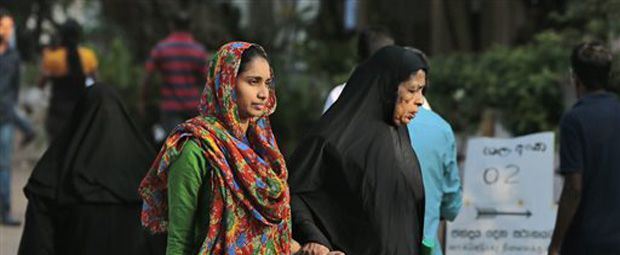[Sri Lankan Muslim women leave after casting their votes at a polling station during the presidential elections in Colombo, Sri Lanka (Photo: AP)]
There were many firsts in the election of President Maithripala Sirisena in Sri Lanka: An incumbent president was defeated; parties specifically representing different races and religious groups — the Jathika Hela Urumaya for the Sinhalese, the Tamil National Alliance (TNA), and the Sri Lanka Muslim Congress along with the All Ceylon Muslim Congress — came together on a common political platform; corruption was a major issue in the pre-poll campaign; and now a specific timeframe has been set for reforms.
However, the most important responsibility of the new government will be settling the national question. While the
country owes him a debt of gratitude for eliminating terrorism from the country, former President Mahinda Rajapaksa
did nothing about the commitments he made in 2009 to ensure inclusive peace.
As a member of the Liberal Party, I urged Rajapaksa to implement the 13th Amendment, which created Provincial Councils in Sri Lanka, but met with no success. I understand that there could have been problems about some aspects of the amendment but those could have been resolved through discussions.
When we negotiated with the TNA, MA Sumanthiran and I found a solution to what had previously been considered the vexed question of powers over land. We met stakeholders, asked them about their apprehensions and assuaged those fears.
Unfortunately, two members of the government acted in bad faith, one even refusing to fulfil instructions the president gave us to act on what had been agreed with the TNA.
Reaching consensus on these matters is a priority and the new government should set a time table for this.
Successive Sri Lankan governments failed because they allowed talks to drag on without any purpose.
India too has a role to play to facilitate discussions on particular issues. Before the election I had prepared a set of draft proposals on ‘Devolution and Empowerment’ and I hope we can proceed with the roundtable as planned with the support of Indian and Sri Lankan think tanks and reach a consensus.
The Rajapaksa government was insensitive towards India. The new Lankan government will have its own set of priorities but it should also understand India’s worries. For example, India is concerned about the increasing Chinese presence in Sri Lanka. While we should have close relations with China, we must also assuage India’s fears.
In addition, we need better people-to-people contact between the two countries. It should not be very difficult to ensure this given our shared culture and the fact that most professionals in both countries speak the same language.
We also need to work harder to secure more private Indian investment and make better use of India’s financial assistance. Instead of using funds only for construction, Sri Lanka must use India’s experience in HRD too.
Sri Lanka’s high commissioner in New Delhi Sudharshan Seneviratne has been working on improving relations between the two business communities but we should also move swiftly on the Free Trade Agreement, which has been held up for years. This does not mean ignoring the concerns of Lankan businessmen who sometimes have got a raw deal from Indian state governments. But such matters should be discussed frankly and solutions must be found to facilitate the economic partnerships that the region needs.
Sri Lanka could also establish a special relationship with India, which will bring Saarc on a par with other regional groups. This region has problems because of the traditional rivalry between India and Pakistan. Sri Lanka, which is in a position to win the trust of both countries, should take the lead in suggesting cooperation on education, cultural engagement and disaster management. A synergistic attitude on these issues could be productive for the whole region.
India’s expertise can also help strengthen Sri Lanka’s independent institutions. By voting out Rajapaksa, the electorate has made it clear that it is tired of an over mighty executive. But we should not make the mistake of thinking that a change of guard will solve the problem. To avoid a recurrence, we must strengthen alternative repositories of authority.
We must ensure that norms prevalent in other parliaments are implemented here too. For example, we must have more effective consultative committees and prevent members of the executive from chairing these or financial oversight committees.
Sirisena has a sterling reputation when it comes to financial integrity and I believe his team will be much more reliable in this regard than the previous cabinet. But still we need to strengthen our systems to ensure transparency.
Perhaps the most important measure proposed in the election manifesto is the Freedom of Information Act, and we need to ensure, as it is in India, that this is a useful tool for the public. Our pact is with the people, and this is perhaps the best way to ensure their primacy.
Finally, we need to get over the shadow of the 2014 United Nations resolution over us. Some of the requirements can be met because this government is in a position to move swiftly on reconciliation, and to expedite the recommendations of the Lessons Learnt and Reconciliation Commission.
With regard to the ongoing war crimes investigation, we have made it clear that a domestic investigation is enough. This was what the United Nations requested in 2012 and 2013, when India supported the resolution, unlike in 2014, when it upheld the principle of sovereignty.
Given the inclusivity of this government, we can easily have a transparent and credible investigation. At the same time, we must ensure that the Disappearances Commission, with assistance from the United Nations Working Group, produces a report without delay. The draft National Reconciliation Policy will make clear our commitment to restorative justice as highlighted in our manifesto.
Rajiva Wijesinha is a member of the Sri Lankan parliament and former adviser on reconciliation to the president.
The views expressed by the author are personal
– Hindustani Times
